If you think the life of a professional gamer off stage is all neon lights and free hoodies, let me ruin that fantasy gently. In my experience, it’s more like spreadsheets, sore wrists, scrims, VOD review, and a sleep schedule that would make a bat frown. I’ve been around to see this scene grow from dusty LAN cafés to big arenas. Yes, the shows are loud. Off the stage? It’s emails, content creation, bootcamps, brand deals, diet fixes, mental health check-ins, and a lot of aim training where no one is clapping. That’s the real esports lifestyle, the daily routine behind the clips.
What people think I do vs. what I actually do
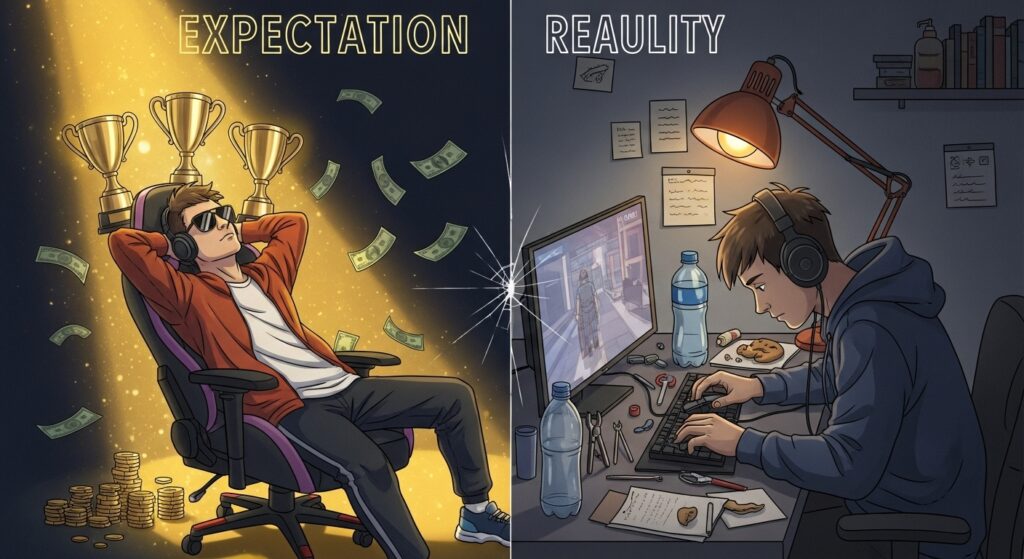
When people ask what I do, I say, “I’m a pro gamer.” They smile. They picture me leaning back in a chair, pressing two buttons, winning money, and tossing my hair like a shampoo ad. Cute. What I actually do: I practice boring things until they aren’t boring. I watch replays. I talk to coaches. I fix my mouse feet like a tiny mechanic. I reply to PR emails. I scan contracts like I’m looking for a trap (because I am). And then I do it again tomorrow.
By the way, if you’re totally new to this scene and want a plain look at the field, skim Esports basics or the history of e-sports. It’s useful context. But the day-to-day? That’s the part most folks don’t see.
The day when no one is watching
Here’s the part I never posted to Instagram because it looks like homework. My day off stage is a stack of small habits. Some are smart. Some are weird. They keep me from falling apart. If you want the short version: practice, review, stretch, eat, sleep, repeat. This is where most careers are built. Not on stage. Off it.
The schedule most days look like
I tweak this often. Tournament weeks get messy. Travel days are chaos. But this is the backbone I fall back to.
| Time | Activity | Notes |
|---|---|---|
| 8:30 | Wake, hydrate | Water, not energy drink (yet). Light stretch. |
| 9:00 | Aim/warm-up | 30–45 min: tracking, flicks, micro-corrections. |
| 10:00 | VOD review | Watch last scrims. Note 3 fixes max. Not 20. |
| 11:00 | Team meeting | Coach leads. Utility timings, set plays, goals. |
| 12:00–3:00 | Scrims | Best practice. No alt-tabbing. Yes, I see you. |
| 3:00 | Break and food | Protein + carbs. Walk. Eyes off screens. |
| 4:00–6:00 | Solo work | Drills, aim training, map review, comms practice. |
| 6:30 | Light workout | Mobility, wrists, back, posture. Boring but gold. |
| 8:00 | Content/stream | Clips, Q&A, scrim highlights if allowed. |
| 10:30 | Shut down | No blue light. Read. Sleep hygiene like a grandma. |
Warm-ups that actually work
I’ve tried the fancy routines. I always come back to simple drills. I do tracking, micro-corrections, and click-timing. Low heart rate. High focus. Ten minutes of the right drill beats an hour of chaos. I also talk during warm-up. I practice my comms out loud. Sounds weird. Works great.
VOD review without falling asleep
If you watch everything, you learn nothing. I pick three moments. I ask, “What would fix this next time?” Then I write it down. That’s it. If I need a deeper dive, I book one with the coach. Short and sharp beats long and mushy.
Scrims: where bad habits go to die
Scrims are fake matches. We run set plays, test ideas, and yes, we mess up a lot. This is where trust gets built. Where timing gets clean. If we’re quiet in scrims, we’re dead on stage. I’ve learned more in bad scrims than in 100 pub stomps. Pain teaches fast.
The unsexy work: emails, contracts, and the polite no
After practice, I open my inbox and remember why I delayed opening my inbox. There are sponsor pitches, event invites, media requests, and some “quick favor” that is never quick. I’m not a lawyer. But I’ve learned to read like one. I check for usage rights, term length, and weird exclusivity. If a deal says “we own your soul and your likeness forever,” I close the tab and go drink water.
Media training is not a meme
Talking well is a skill. I do mock interviews. I record my audio. I cut filler words. I learned the hard way that good sound makes you look smart. If you want to dig in, here’s a solid breakdown on pro gamer interview tactics, pitch prep, and clean audio. It’s not glamorous, but it helps when the camera light turns red and you forget your own name.
Social media without losing your mind
I post, I interact, and I log off. Boundaries keep me sane. If you live in your mentions, your brain turns to soup. I respond to real questions. I skip bait. I mute words. It’s not rude. It’s survival.
Mind and body: the quiet grind
Let’s talk tilt. Tilt is that hot, dumb feeling when your brain decides to play as a potato. I know it well. The cure? Stop early. Stand up. Breathe. Write one note on what went wrong. Then do one tiny fix next match. Tiny wins beat heroic comebacks. This isn’t a movie.
Sleep is an S-tier buff
Seven to eight hours. Cold room. Dark. No caffeine after 3 p.m. Blue light off an hour before bed. I’m not perfect. But when I keep this, my aim is cleaner, my reads are faster, and my tilt tolerance is higher. Sleep isn’t “nice to have.” It’s the patch that keeps your brain stable.
Therapy and sports psych are normal
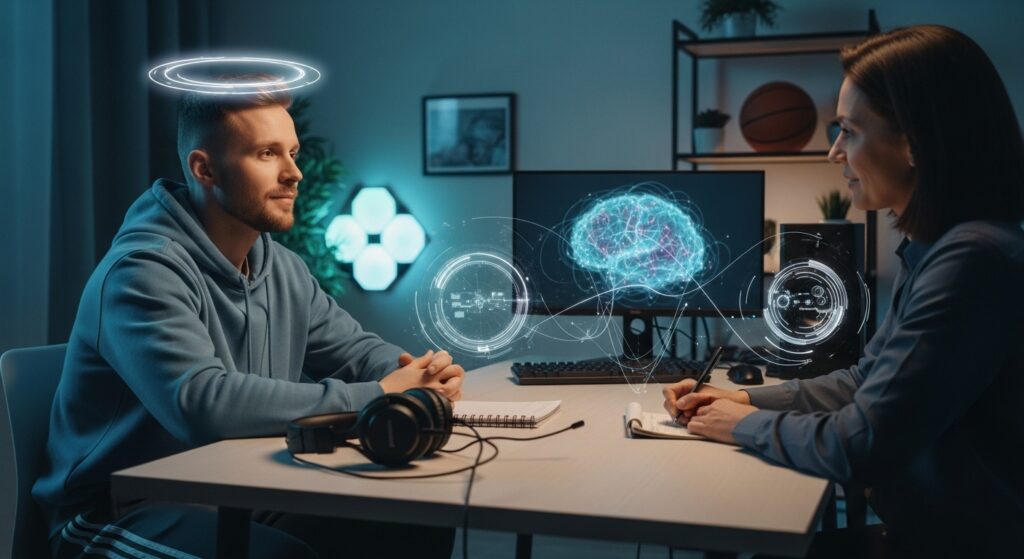
I’ve worked with a sports psychologist. We built routines for nerves, self-talk, and reset drills between rounds. It felt odd at first. Now it’s part of my kit. Just like a mouse pad. If your head is messy, your hands follow. There’s no shame here. Only gain.
Travel and “glamour”
Tournament travel sounds cool until you realize you slept three hours and your bag didn’t make the connection. I pack an emergency kit in my carry-on: mouse, headset, cables, tape, pain patches, and a backup USB stick with settings. Customs agents do not care that your mouse is “special.” Pack smart.
What I pack every time
- Main mouse + backup mouse
- Headset + foam covers
- Keyboard or gamepad + cable
- USB stick with configs
- Power adapters, surge protector
- Wrist wraps, kinesio tape, pain relief
- Snacks that aren’t sugar bombs
- Eye mask, ear plugs, melatonin (if cleared)
Food, energy, and not crashing mid-map
I don’t eat like a rabbit. I also don’t chug five energy drinks and call it a diet. I try to keep it simple: protein, carbs, some fat. I eat steady, not heavy. Big meals make me slow. I sip water all day. Coffee early. Not late. It’s not exciting, but winning at 9 p.m. is a lot easier when your hands aren’t shaking.
Snack ideas that don’t wreck you
- Greek yogurt with fruit
- Rice cakes with peanut butter
- Trail mix (measure it, or you’ll eat a bag)
- Turkey sandwich
- Berries and dark chocolate
Content vs. competing
People assume streaming is “just press go.” Ha. That button is heavy. Streaming helps your brand, your fan base, and your sponsors. It also kills your focus if you do it at the wrong time. I put scrims first. Then content. If there’s a big match coming up, I cut stream hours. I lose some views. I gain sanity. Fair trade.
Algorithm stuff I wish I didn’t know
Shorts do well. Clips need context. Titles matter too much. Thumbnails matter more than titles (who decided this?). I keep a simple content plan: one long, two short, one live per week. Repeat. It’s fine. Not art. Just consistent.
Parasocial weirdness
Fans are great. 99% are kind. 1% think they own your time. I keep the door open but not wide. No DMs at 2 a.m. No “come carry me bro” on my off day. Healthy lines keep me a human and not a vending machine.
Friends, family, and missed birthdays
I’ve missed birthdays, weddings, and dinners. Time zones don’t care that your cousin is getting married. I set reminders and send notes. I call on walks. I book vacations in the off-season and actually go. Real life matters. The game ends. These people don’t.
Money, without the fake flex
People think prize money is the whole pie. It isn’t. It’s a slice. Some months are fat. Some are lean. You need a buffer. Taxes are real. Save before you spend. Not financial advice. Just the voice of someone who once forgot about quarterly taxes and wanted to cry into a spreadsheet.
Where the money comes from (rough)
| Source | Typical Share | Notes |
|---|---|---|
| Team salary | 40–60% | Stable base. Negotiated yearly or per split. |
| Prize winnings | 5–25% | Unstable. Team split, taxes, manager cut. |
| Sponsors/brand deals | 10–30% | Deliverables matter. Read usage rights twice. |
| Streaming/content | 10–25% | Subs, ads, donations, affiliate links. |
| Coaching/consulting | 0–10% | Off-season or side gigs. |
And where it goes
- Rent and travel gaps (yes, you still pay rent while you’re gone)
- Taxes (plan for 25–35% depending on where you live)
- Gear and replacements (mice, pads, headphones die)
- Healthcare, therapy, physio
- Editor, designer, thumbnail artist
- Savings and emergency fund (please)
Gear upkeep and tiny rituals
I keep a notebook just for setup notes. DPI, in-game sens, mouse feet age, pad condition, chair height, monitor brightness, crosshair settings. I date it. Sounds obsessive. It saves me when my aim feels “off” and I don’t know why. Data beats vibes, even if vibes are loud.
Maintenance that keeps me honest
| Item | Check | How Often |
|---|---|---|
| Mouse feet/skates | Wear, glide smoothness | Monthly or before LAN |
| Mouse sensor | Lint, dust | Weekly |
| Mouse pad | Oil buildup | Wash every 2–3 months |
| Keyboard | Stuck keys | Monthly clean |
| Headset | Cushion wear | Replace pads every ~6 months |
| Chair | Posture support | Daily check, adjust |
| Monitor | Refresh rate, color | Before matches |
Pre-match ritual, minus the prayer circle
- Two songs I always use. Same rhythm every time.
- Three deep breaths before map load.
- Hand warmers for 2–3 minutes.
- One sentence goal: “Stay calm on retakes.”
- Water sip. Not an energy drink.
Team stuff that doesn’t happen on stage
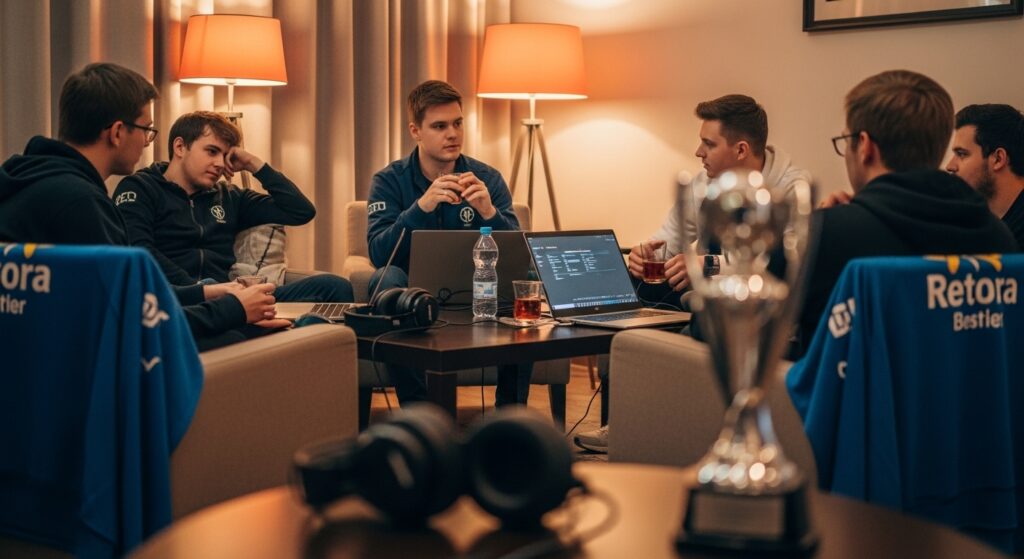
We do check-ins. Not the fake kind. Real ones. Are you sleeping? Any pain? Any stress at home? This matters. I’ve watched a team look strong on stage and fall apart in hotels. Off-stage trust is stage strength. We also do culture work. That means we talk about how we fight. How we fix. How we forgive after a bad day. Corny? Maybe. Necessary? Yes.
Injuries and the not-cool part of long hours
My wrists have yelled at me. My back has filed complaints. What helps: mobility, posture checks, breaks, and seeing a physio before pain turns giant. I stretch my forearms. I roll my back. I set timers. And I keep my mouse grip relaxed. Death grip means pain later.
Learning, even after you “make it”
I still study every week. New metas, new patches, new maps. I watch other pros and ask dumb questions. Dumb questions are smart questions in disguise. The second you think you’re done learning, the leaderboard punishes you. It’s harsh, but fair.
Long game: what happens after
I’m not playing forever. None of us are. So I test side paths: coaching, analysis, casting, content strategy, startup work in gaming tools, maybe school part-time. I mentor younger players when I can. I write stuff like this. The stage is a season. The work lasts longer.
A tiny note on respect
I roll my eyes at some memes, sure. But I respect the grind in this scene. Players, coaches, editors, managers, ops folks—this machine moves because a lot of people do hard things quietly. The show is loud. The craft is quiet. I live more hours in the quiet part. That’s where the real gains hide.
Two truths and a lie about this job
- Truth: I love it. Even on the dumb days.
- Truth: It’s work. Real work. Not pretend.
- Lie: It’s easy money. It’s not. Ask my accountant.
Some quick comparisons I get asked about
| Topic | What Fans Assume | What Actually Happens |
|---|---|---|
| Practice | Just play ranked all day | Structured scrims, VODs, targeted drills |
| Travel | First class, parties | Delays, lobby food, media day at 7 a.m. |
| Money | Prize pools = rich | Salaries + deals + taxes + uncertainty |
| Health | “You sit, how hard can it be?” | Wrists, back, sleep, stress—needs care |
| Free time | All day | Content, meetings, gym, study |
Why I still love it
Because the craft is beautiful. The tiny improvements pile up. A cleaner retake call. A smarter rotate. A better clutch mindset. I like that the life of a professional gamer off stage is built on all these quiet changes. It suits me. Loud arenas are fun. But the steady stuff is where I feel most at home.
One more behind-the-scenes take
When people ask me for advice, I tell them to look at what I do when nobody cares. That’s the real job. Can you sit in a chair and fix one habit each day? Can you live the boring minutes? That’s where the edge comes from. The highlight reel is a receipt. The work is the purchase.
Little notes I wish someone told me year one
- Pick one sensitivity and stick to it for months. Stop chasing ghosts.
- Fix your posture before it fixes you.
- Have a “bad day plan”: two drills, one VOD, stop early.
- Write down your comms goals like you write down workouts.
- Turn off messages mid-match. Protect your focus.
- Hydrate. Yes, again. Your brain needs water to aim.
- Practice being calm. It’s a skill, not a trait.
The not-so-obvious social part
I play a team game. Even solo players have teams around them. I try to be normal in a long week: say good morning, mean it, give clear feedback, listen more than I talk. I don’t stew. I don’t subtweet. If I mess up, I say so. That builds trust. That wins maps later, when it matters.
Wrapping this up without wrapping it up
I could keep going. There’s always more. But you get the picture. The life of a professional gamer off stage feels small from the outside. It isn’t. It’s the main event, just quiet. If you like quiet work with loud results, you’ll like this life. If not, that’s fine too. I’ll be here, fixing one more tiny thing. Then another.
FAQs (stuff people DM me all the time)
- How many hours should I practice if I’m in school? 2–4 solid hours. Do drills, one VOD, one block of ranked. Quality over grind.
- Do I need a super expensive PC to go pro? You need stable frames and a good monitor. Past that, it’s skill and habits. Don’t go broke.
- How do I stop tilting? Pre-plan a reset: stand up, breathe, one note, one fix. If you stack losses, stop early.
- What’s a good warm-up? 10–15 min tracking + click-timing + comms out loud. Keep it simple and repeatable.
- Should I stream every day? No. Comp first. Stream when it helps, not when it hurts practice. Keep your balance.

John | Your source for Esports, Battle Royale, Role-Playing, Retro Games, and Gaming Gear. Let’s Enjoy!

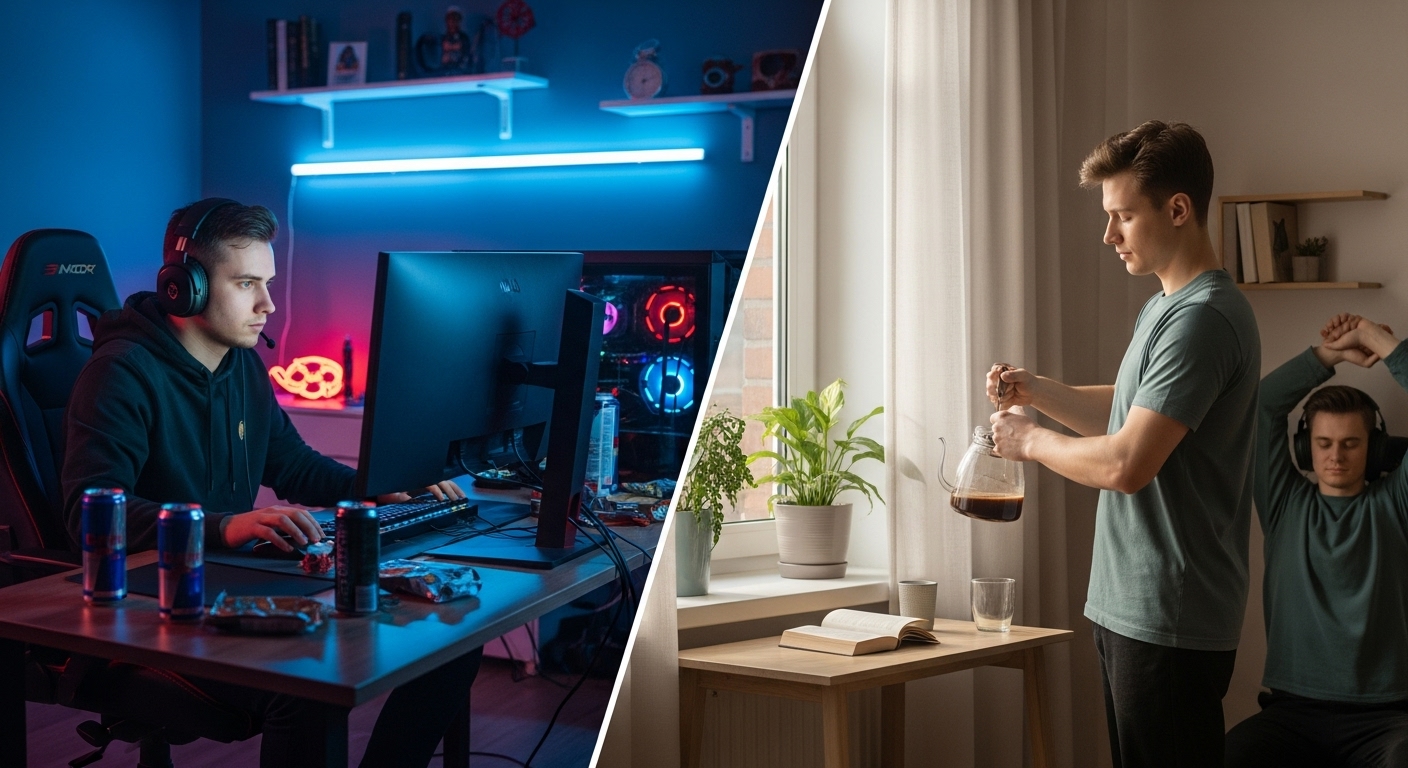
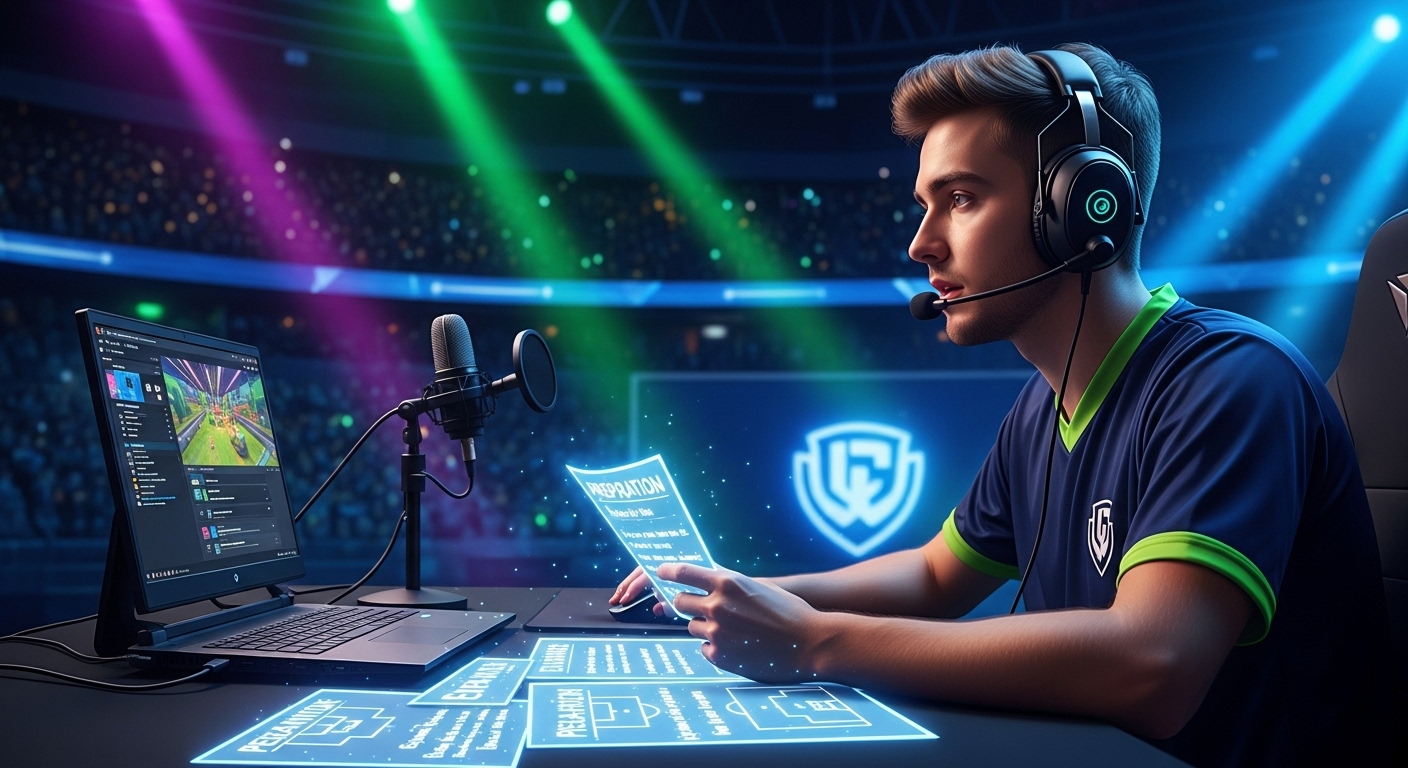
Video games hard work; not all fun and games. Dedication and routine key for success.
Pro gaming: not all glitz and glamour. It’s more about grind, preparation, and dedication behind the scenes.
This gives a whole new perspective on the hard work that goes into being a pro gamer.
Pro gaming is not all glitz and glam – it’s hard work, dedication, and routine behind-the-scenes hustle.
Sounds like a grind! Behind the scenes, it’s all hard work and dedication. Truly inspiring for aspiring gamers.
Esports pros are grinders behind the scenes, not just flashy gamers on stage. Respect the hustle.
The unsexy work of pro gamers is just as important as the glory on stage. Practice makes perfect!
The behind-the-scenes life of a pro gamer is a grind of hard work, discipline, and dedication. No glamor here!
How do you balance content creation with competitive practice effectively in your daily routine?